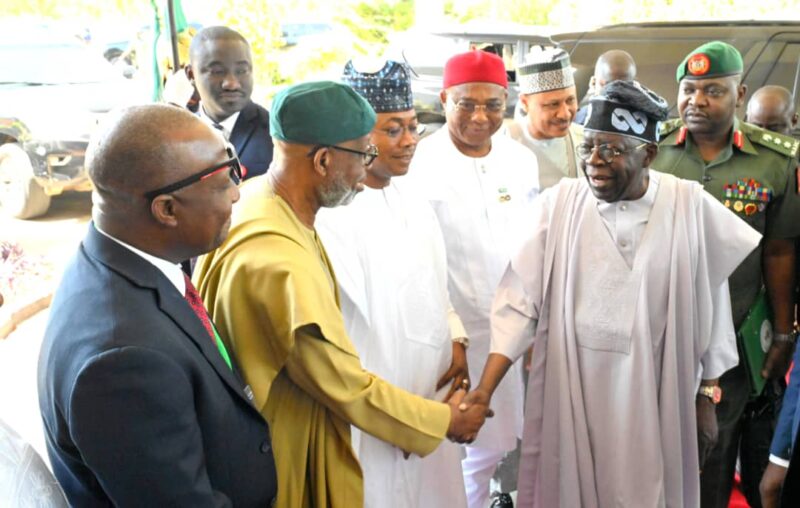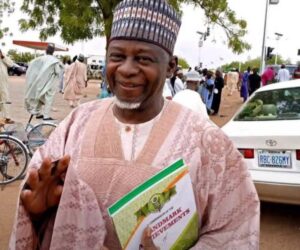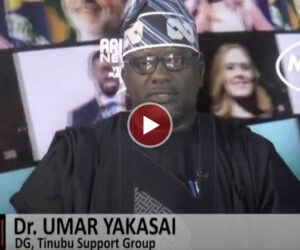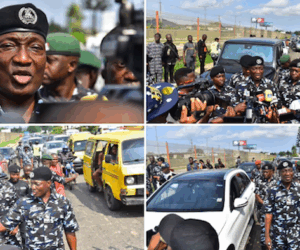In what can be described as a major step towards boosting the nation’s media operations, President Bola Ahmed Tinubu, Wednesday, gave his nod to th(e proposals made by the Nigerian Guild of Editors (NGE) to save the sector from distress.
President Tinubu also called on editors to be responsible and responsive in their gatekeeping role in order not to undermine national cohesion and democratic stability.
He spoke while declaring open the 21st All Nigeria Editors Conference (ANEC) at the Presidential Villa in Abuja.
*To this end, he pleaded with the president to approve corporate tax relief for 10 years, VAT , tax deductions, and access to affordable financing sector.
…Tinubu’s response
Addressing about 400 delegates at the conference, President Tinubu, in a response to the NGE’s demands, said: “I’ve listened to the guild’s requests -corporate tax relief, VAT extension, affordable loans from the Bank of Industry, and development grants for digitisation. You know, as your president, I endorse your proposal. Your request is in my pocket.”
Tracing the history of the Nigerian media to the pre-independence role it played, the president warned that cynicism and unverified reports is a threat to national unity.
He called on Nigerian editors to wield their influence with integrity, wisdom and a renewed sense of national duty.
President Tinubu said the health of the country’s democracy depends as much on responsible journalism as it does on elections and the rule of law.
He said the media must continue to function as a stabilising force in national life, promoting unity, truth, and accountability in the face of misinformation and growing public cynicism.
The president commended the NGE for its consistency in convening national conversations on professional ethics and democratic development.
“Your presence here reflects the enduring importance of the media in shaping national direction and strengthening democratic life,” he said.
He described journalism in Nigeria as an instrument of national awakening that has historically stood firm in moments of crisis.
He paid tribute to generations of journalists who risked persecution, detention and hardship to defend truth and justice.
“From the early newspapers that challenged colonial injustice to the principled voices that kept hope alive during the dark days of military dictatorship, the Nigerian press has stood at critical points in our nationhood to defend reason, dignity and progress.
“We honour them not only in memory but also by remaining committed to the values they upheld,” he said.
Tinubu cautioned that freedom won through sacrifice must be guarded with responsibility.
“Freedom secured through struggle is not self-sustaining,” he said.
“It requires constant vigilance and responsible exercise. A democracy is sustained not only by elections and laws, but also by the integrity of public conversation,” the president added.9
….Gatekeeping role
Highlighting the enormous influence of editors as gatekeepers in national discourse, the president said the narratives framed by them determine how citizens interpret the country’s challenges and aspirations.
He said: “You shape narratives. You influence public understanding. You decide what becomes national focus and how our collective challenges are interpreted,” he said, urging them to exercise that power with “wisdom, fairness, and a strong sense of national duty.”
Acknowledging the plural and often contentious nature of Nigeria’s public space, the president urged that disagreements should never degenerate into divisions that weaken national cohesion.
“Criticism, when informed and constructive, is a service to the nation. But cynicism that breeds mistrust and despair can weaken the very foundations of the society we all seek to improve,” he said.
President Tinubu expressed concern over the rise of misinformation in the age of social media, describing it as one of the greatest threat to responsible journalism.
“Falsehood can take root before truth has time to speak,” he warned, adding that “in such an environment, the editorial function is more important than ever. Verification must be your anchor; balance must be your principle and professional judgment must be your guide.”
Tinubu urged editors to continue reporting boldly but truthfully, reminding them that their mission should always aim at strengthening rather than tearing down the nation.
“Critique government policy but do so with knowledge and fairness. Your aim must never be to tear down, but to help build a better society,” he said.
…Administration’s performance
On his administration’s performance, the president reaffirmed his commitment to national security, economic stability and inclusive growth.
He said the ongoing reforms were designed to restore macroeconomic balance, attract investment and rebuild confidence in Nigeria’s economy.
“The signs of progress are visible in several sectors. Still, we know there is more work to do, and we remain focused on ensuring that growth translates into real improvements in the daily lives of Nigerians,” the president said.
He, however, stated that government action alone cannot achieve the nation’s aspirations, as “nation-building requires cooperation. It requires trust. It requires a shared understanding that our future is tied together.
“Government has its role. The private sector has its role. Civil society has its role. And the media has a distinct responsibility to help shape a climate of reason and unity.”
Calling for renewed professionalism and patriotism in the media space, the president urged editors to “choose clarity over confusion, responsibility over recklessness, and hope over despair.
“Distinguished editors, your work matters, the tone you set in your newsrooms, the standards you enforce, and the courage with which you defend the truth will all help shape the direction of our national journey. Let us carry this responsibility with purpose.
“Verification must be your anchor. Balance must be your principle. Criticise government policy, but do so with knowledge and fairness. Let your aim be to help build, not destroy,” he said.
He reaffirmed his commitment to restoring economic stability, attracting investment, and improving citizens’ welfare, noting that the initial pains of reform were necessary to curb corruption and lay a solid foundation for recovery.
Editors critical role – Uzodimma
In his speech, Imo state Governor Hope Uzodimma, while delivering the keynote address, reminded editors of their critical role in shaping Nigeria’s democratic future.
“You are not spectators in 2027, you are catalysts. The narratives you shape will determine whether Nigerians see the elections through a tribal lens or a shared national destiny,” he said.
Uzodimma warned that without electoral integrity, democracy cannot survive, urging editors to embrace accuracy, verification, and context over sensationalism.
—President’s presence respect for media – Idris
Also addressing the gathering, Minister of Information and National Orientation Mohammed Idris described President Tinubu as a true reflection of the resilience, courage, and enduring struggle that had defined the Nigerian media through the country’s democratic evolution.
He said the president’s presence at the conference underscored a profound symbol of respect and solidarity with the Fourth Estate of the Realm.
“Mr. President’s life and leadership embody the same fortitude that has defined the Nigerian press from its earliest days. Like the media, he has stood firm in defence of truth, democracy, and the people’s right to be heard. His story and that of the Nigerian media are intertwined in resilience,” Idris said.
The minister noted that President Tinubu’s administration has continued to show faith in the media as a partner in national renewal.
Reaffirming the administration’s commitment to press freedom, he disclosed that over 1,000 licensed radio and television stations were currently operating across the country without intimidation or censorship.
He emphasised that under President Tinubu’s leadership, no media organisation has been shut down or sanctioned for dissenting views.
…Our challenges – NGE
Highlighting the challenges facing the media, NGE President Anaba, expressed concern about the harsh economic conditions under which the Nigerian media operates and called on the federal government to intervene to save industry players struggling to pay staff salaries and operational costs.
Anaba said the current economic challenges in the country threatened media viability.
“Most newspapers and television houses today cannot pay salaries, not because they are not doing well, but because the cost of producing content is prohibitive. A single newspaper can cost up to N1.3 to N1.4 million monthly just for production materials like ink and plates, which are largely imported,” he said.
Anaba said without economic sustainability, the media’s constitutional role to inform and hold the government accountable is at grave risk.
in a direct message to the president, Anaba saÌid: “Your administration has worked hard to provide jobs, but if the media cannot pay its workers, it cannot help strengthen our democracy. That is why we look to you, Your Excellency, for intervention to strengthen the media industry.”
The NGE president called for fiscal support mechanisms modelled on practices in countries like Canada, India, and South Africa among others, including grants and tax incentives to sustain media organisations over the long term.








